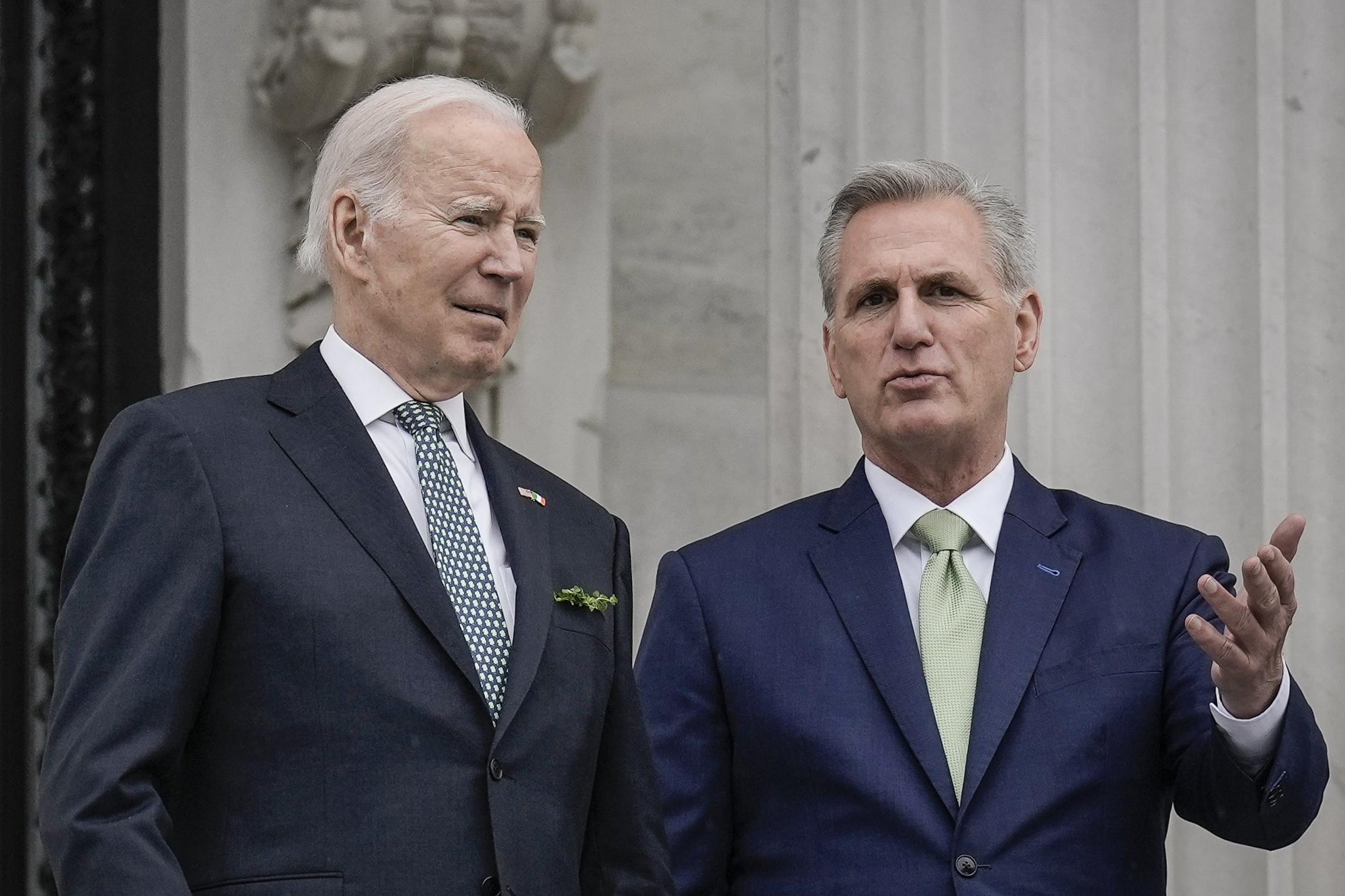A baffling development in Washington over the past week: Republicans and Democrats have been meeting to hash out a deal to lift the debt limit—and they’re not not making progress.
The four top congressional leaders and President Biden are scheduled to meet for a second time on Tuesday after a busy week of negotiations between their respective staffs. The meeting will come about two weeks before the Treasury is expected to run out of borrowing capacity to pay the country’s bills. Congress could always pass a short-term extension if negotiations continue to show promise. But negotiators first have to settle on a deal, then allow for a week or so to sell the prospective deal to their respective parties and process it through the legislative body. The best-case scenario involves a highly unpleasant Memorial Day weekend for all those involved.
So, how did we get here, and what needs to happen to avert economic catastrophe?
In late April, House Republicans passed their Limit, Save, Grow Act by the narrowest of margins. In exchange for raising the debt ceiling until next March, the bill would cut the discretionary spending budget, then cap its future growth. It would claw back unspent COVID funds, apply work requirements to various federal benefit programs for poor Americans, repeal the Inflation Reduction Act’s IRS expansion and clean energy tax credits, and enact a bunch of Republican energy priorities.
Because Senate Democrats lack 60 votes to pass a so-called clean debt limit increase, House Speaker Kevin McCarthy has been able to force the Biden administration to the negotiating table with this bill. But there is some spin at work here from Biden’s team. The administration, which had refused to negotiate over the debt ceiling, is saying that it’s negotiating with Republicans just on the normal budget and appropriations process. Uh-huh.
Let’s be serious. Biden is inviting McCarthy into his office every week now because he needs the debt limit raised by the beginning of June.
Certain areas of overlap of a would-be deal came into view ahead of Tuesday’s meeting. The Biden administration has made clear that it is not going to allow Republicans to repeal the entire clean energy title of their signature legislative act from the most recent Congress. But some elements of the Limit, Save, Grow Act are still on the table.
The lowest-hanging fruit appears to be unspent COVID funds. Sure, both parties can agree to claw back some of that.
Both sides also seem to agree there can be some sort of restraint on discretionary spending. But what, exactly?
Republicans want to cut more than $100 billion from nondefense spending right off the bat, and then cap spending growth at 1 percent for the next 10 years. Democrats will never agree to a deal that allows for substantial cuts exclusively to domestic spending while leaving defense spending growing at its usual pace. Democrats also don’t want to agree to 10-year caps. Where’s the deal to be had here? Perhaps some sort of spending freeze for the next year or two, something that became an inevitability the instant Republicans reclaimed control of the House.
One area in which Republicans and Democrats could both get a win would be through permitting reform, which is a live part of the discussions now. The only question is: What permitting reform? Are we talking just making it easier to jump-start traditional fossil-fuel extraction projects? Or will it be an all-of-the-above approach that allows Democrats to more quickly ramp up their clean energy investments? Here’s another question: Do these sound like decisions that are going to be put together in a week? (Not really.)
The most confounding area of live engagement right now is on the question of work requirements. It seemed like a sop to the Freedom Caucus when additional requirements for beneficiaries of Temporary Assistance for Needy Families, Supplemental Nutrition Assistance Program, and Medicaid were tossed into the Limit, Save, Grow Act. Those weren’t actually going to go anywhere, right? Biden, however, wasn’t as dismissive when talking to reporters during a weekend bike ride.
“I voted for tougher aid programs that’s in the law now,” Biden said of the work requirements, “but for Medicaid it’s a different story. And so I’m waiting to hear what their exact proposal is.”
The cleanup statement from the White House didn’t categorically rule out changes to SNAP or TANF either.
“As the President said, Medicaid is a different story, and the President has been clear that he will not accept proposals that take away peoples’ health coverage,” spokesman Michael Kikukawa told Politico. “The President has also been clear that he will not accept policies that push Americans into poverty. He will evaluate whatever proposals Republicans bring to the table based on those principles.”
If the White House agrees to tighten the screws on welfare and SNAP eligibility, House Democrats will absolutely lose their minds. If McCarthy doesn’t get the White House to tighten the screws at all, the hard-right might decide that dear Kevin didn’t quite get the job done and should have his speakership reexamined.
Who knows how McCarthy actually feels about a deal coming together. But walking into his office Monday morning, he was performing despondence.
“It doesn’t seem to me yet that they want a deal. It just seems that they want to look like they’re in a meeting, but they’re not talking anything serious,” McCarthy told NBC about the Democrats. “It seems more like they want a default than a deal to me.”
I don’t know if a deal along the parameters they’re negotiating can come together in time, or whether the outcome will be determined by a few days of market crisis and panicky legislating—or executive action—in early June. But the trash talk about how unserious the other side is will continue, regularly, until a resolution is reached.
